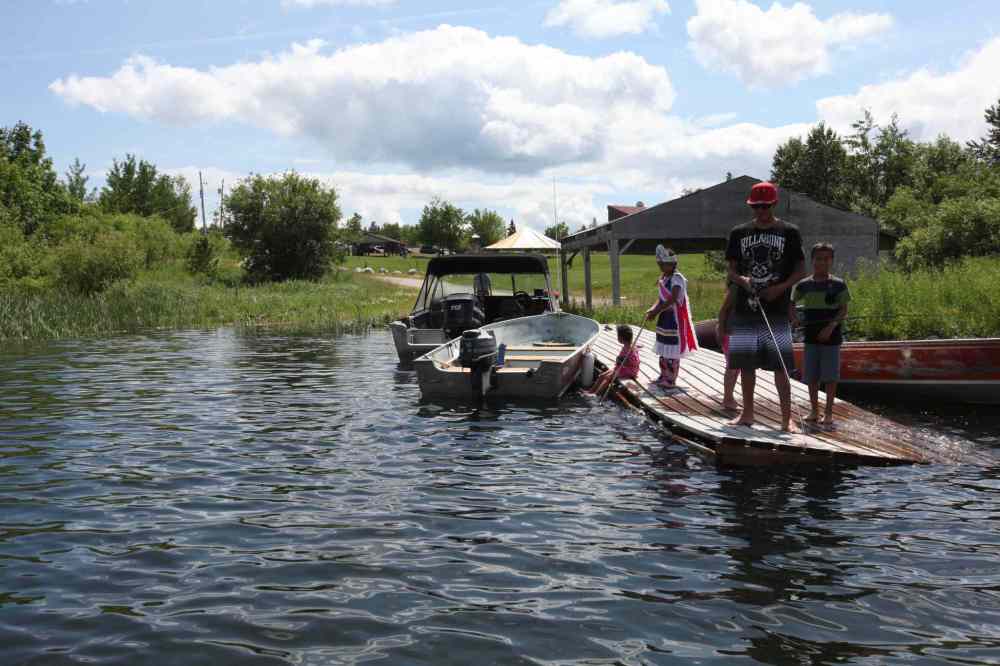Winnipeg resident begins fundraising effort to build road for Shoal Lake
Raises $13,000 in first 24 hours, but long way to go to reach $10 million
Advertisement
Read this article for free:
or
Already have an account? Log in here »
To continue reading, please subscribe:
Monthly Digital Subscription
$0 for the first 4 weeks*
- Enjoy unlimited reading on winnipegfreepress.com
- Read the E-Edition, our digital replica newspaper
- Access News Break, our award-winning app
- Play interactive puzzles
*No charge for 4 weeks then price increases to the regular rate of $19.95 plus GST every four weeks. Offer available to new and qualified returning subscribers only. Cancel any time.
Monthly Digital Subscription
$4.99/week*
- Enjoy unlimited reading on winnipegfreepress.com
- Read the E-Edition, our digital replica newspaper
- Access News Break, our award-winning app
- Play interactive puzzles
*Billed as $19.95 plus GST every four weeks. Cancel any time.
To continue reading, please subscribe:
Add Free Press access to your Brandon Sun subscription for only an additional
$1 for the first 4 weeks*
*Your next subscription payment will increase by $1.00 and you will be charged $16.99 plus GST for four weeks. After four weeks, your payment will increase to $23.99 plus GST every four weeks.
Read unlimited articles for free today:
or
Already have an account? Log in here »
Hey there, time traveller!
This article was published 30/06/2015 (3845 days ago), so information in it may no longer be current.
OTTAWA – More than 100 people stepped up within the first 24 hours of a crowdsourcing effort to build a road to the Shoal Lake First nation.
The Fundrazr effort was started Monday by Rick Harp, a Winnipeg man who has no connection to Shoal Lake except being a Winnipeg resident who drinks water drawn from there.
“I saw the news coverage, I saw the images of weeping children, weeping adults, and I felt compelled to act,” Harp told the Free Press this morning.

Shoal Lake First Nation, located just east of the Manitoba-Ontario border, became a man-made island in 1914 when an aqueduct to pump water to the City of Winnipeg was built.
The reserve can actually hear the cars on the Trans-Canada Highway but can’t reach it without aid from a winter-ice road or in the summer, a ferry.
That ferry was put in drydock this spring when a federal inspection declared it unsafe.
The community has been under a boil-water advisory for almost two decades, a clear indication of the living differences for First Nations, since the entire city of Winnipeg gets clean drinking water from the lake and the people who live right on it cannot.
The ferry is running again but it is old and a permanent solution needs to be worked out.
Last week the Manitoba government and the City of Winnipeg both made a pledge to fund part of the cost of a permanent, all-weather road.
The federal government, however, offered $1 million only for an engineering study for a road, not any money for the road itself.
When asked whether the government would be at the table to help pay for the road, Natural Resources Minister Greg Rickford, who also represents the area as its MP, said he had nothing further for them.
When reporters asked him what he would tell the kids at the event about the road he said only, “Hi guys.”
That response left a bad taste in Harp’s mouth.
So on the weekend he posted a feeler on Facebook to see whether a crowdfunding effort might get any traction and he was encouraged by the response.
So on Monday he began a Fundrazer.com effort and within 24 hours the page had raised nearly $13,000 from 113 donors.
Some of the comments from donors suggest people believe it’s their responsibility, since they live in Winnipeg and drink clean water.
“This is the least I could do for the people of Shoal Lake,” said Dan Powell, who pledged $100.
“It’s about time we talk about our water and where it comes from,” wrote an anonymous donor of $100.
“My family wants to thank the people of Shoal Lake 40 for the water we drink each day,” wrote Kim Flynn, who donated $200.
It’s a long way to get to the $10-million goal by the end of August (and nobody who pledged money will be asked to pay unless the goal is reached). But Harp said even if the goal isn’t met the campaign helps raise awareness.
“This situation needs to have, in my opinion, constant attention,” he said. “If this brings attention and motivates to action then the campaign has done its job.”
He said he’s not purposely doing this to try to embarrass Ottawa into acting but said he is saddened that individuals know the need and the federal government doesn’t see it or doesn’t care.
Emily Hillstrom, a spokeswoman for Aboriginal Affairs Minister Bernard Valcourt said Ottawa has not closed the door to funding the construction of the road itself.
“Our investment of $1,000,000 to design this road is a tangible contribution to improving access to Shoal Lake 40 First Nation,” wrote Hillstrom in an email. “Once the design is complete, and all costs are known, discussions about federal funding for the construction of the road can take place.”
Mia.rabson@freepress.mb.ca
History
Updated on Tuesday, June 30, 2015 1:11 PM CDT: Updates with comment from spokesperson of Minister of Aboriginal Affairs


